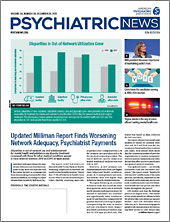Sometimes a matter of personal ethics is so strong that it must find its way into professional ethics as well. This is the case with climate change and the threat it poses to humanity and biodiversity. Both the institutions of our profession and individual psychiatrists must play a vital role in the response to global climate change.
In 2017, APA issued a position statement titled “Mental Health and Climate Change.” The statement includes a commitment by APA to “support and collaborate with patients, communities, and other health care organizations engaged in efforts to mitigate the adverse health and mental health effects of climate change.” APA also has a feature on its website called “Climate Change and Mental Health Connections” containing articles on the effect of climate disasters on mental health, promotion of resilience in the face of climate-related disasters, and public perception of climate change’s impact on health.
As stated on APA’s climate change webpage, the physical impacts of climate change include increased exposure to vector-borne and heat-related illnesses, as well as disruption of health care services and health-promoting activities. The mental health impacts include strain on relationships, posttraumatic stress disorder, depression, anxiety, and grief. The community health impacts include increased social instability and reduced community cohesion, which in turn may lead to more aggression and crime.
It is helpful that APA has taken a clear position; however, institutional policy is not enough. Individual psychiatrists may want to find ways to acknowledge and address climate change in their professional lives. Section 7 of the Principles of Medical Ethics asserts, “A physician shall recognize a responsibility to participate in activities contributing to the improvement of the community and the betterment of public health.” Although they are important, pragmatic actions such as reducing waste and increasing recycling in the workplace, finding alternate ways to commute to work, or other ecologically sound practices are only the beginning of a psychiatrist’s responsibility.
Climate-related interventions specific to psychiatrists include recognizing ecological grief when it arises in the treatment setting. Ecological grief is a term coined by public health researchers Ashlee Cunsolo and Neville Ellis, who define the term as the “grief felt in relation to experienced or anticipated ecological losses, including the loss of species, ecosystems, and meaningful landscapes due to acute or chronic environmental change.” Although their research focuses on the disruption and loss sustained as a result of climate change for Inuits in northern Canada and farmers in western Australia, the concept of grieving the changes in our physical world has universal application. Watching depictions of the melting of polar ice or the desertification of vast swaths of once-fertile land may generate a sense of despair or helplessness. Closer to home, we may be sad when we miss butterflies and bees that used to visit the garden, suffer loss because our favorite hiking spot has succumbed to wildfire, or feel anxious that our local beach will be eroded by the next superstorm.
All of humanity is vulnerable to a personal sense of loss as a result of climate change, but some groups are at increased risk for environmental loss. Economic and racial inequities affect the degree to which people are vulnerable to climate change. Trailer homes are most at risk in tornadoes, because they have less stable foundations and construction and are found in parts of the country with the highest incidence of tornadoes. Similarly and on a larger scale, developing countries like the Bahamas, the Philippines, and Haiti suffer the most after hurricanes because their structures and infrastructure are more vulnerable to destruction than in wealthier countries. Their citizens suffer not only from losing their homes and workplaces, but also their loved ones. Additionally, the devastation from hurricanes in the developing world interferes with human and social development, widening global economic and social disparities. According to the Centers for Disease Control and Prevention, a further inequity related to climate change is that people who are elderly, poor, and homeless are among those at greatest risk of heat-related death.
An additional concern is environmental racism. Black, Latino, and Native communities bear a disproportionate burden of exposure to toxic waste sites, poorly managed sewage treatment plants, and water containing lead and arsenic. Nearly 25% of Superfund sites are in Native communities, and 21% of people of color in the United States live within three miles of a Superfund site. Oil pipelines are routed through Native lands because the federal government sent Native people to areas the government least valued, and these are the same areas that are deemed “least disruptive” for pipeline construction. Indeed, Native populations may have inherited ecological grief, because they have been experiencing the loss of home and habitat for many generations. It is important for psychiatrists to foster our own awareness of these complex environmental and climate losses to promote cultural competence, so as not to overlook these nuances of climate effects in our clinical work and research.
If a patient expresses something that sounds like ecological grief, it may be helpful to use that term. Having names for feelings increases empathy and adaptation. Supporting patients as they articulate the further injustices experienced by their particular communities may help them feel heard and respected. There is likely an epidemic of ecological grief in the world right now, yet without the language to discuss and study it, we are less able to intervene in a helpful way.
Psychiatrists know that talking about a loss helps a person to process and overcome it, to move from despair to self-efficacy. We are in a unique position to help our patients and the public name the pain that comes up so frequently these days in response to manifestations of climate change and environmental degradation. ■
The author thanks Alex Menninger for contributing important ideas to this column.
APA’s position statement on climate change is posted
here. “Climate Change and Mental Health Connections” can be accessed
here.
References:

